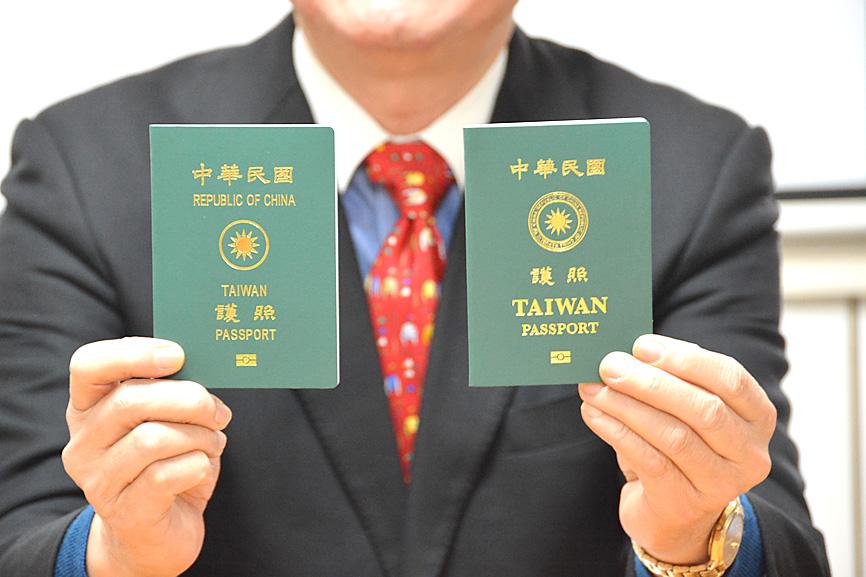Passport applications have nearly doubled since the release of a new design in January, with more than 90,000 applications received since then, the Ministry of Foreign Affairs said yesterday.
The ministry on Jan. 11 released a new passport design that removed the English-language words “Republic of China” from the cover — but retained the Chinese-language equivalent — and featured the word “Taiwan” more prominently.
Following the global outbreak of COVID-19 last year, which restricted international travel, the number of passport applications dropped to about 800 per day, but that number has grown to an average of 1,354 per day since the ministry began issuing the new passport, it said.

Photo: Wang Chun-chi, Taipei Times
The increase was evidence of public support for the new design, and showed that people are already making preparations for when the COVID-19 pandemic ends, it said.
“As you can guess, there is going to be an explosion of demand for overseas travel when the pandemic is over,” Bureau of Consular Affairs Deputy Director Chou Chung-hsing (周中興) said.
“My advice is for people to take advantage of the current lull to get their passports early and avoid the crowds later on,” he added.
The bureau has received 93,420 applications for the new passports, he said, adding that there had been an average of only 794 applications per day between March and December last year.
Prior to the pandemic, the bureau saw an average of more than 7,000 applications per day, he said.

CARROT AND STICK: While unrelenting in its military threats, China attracted nearly 40,000 Taiwanese to over 400 business events last year Nearly 40,000 Taiwanese last year joined industry events in China, such as conferences and trade fairs, supported by the Chinese government, a study showed yesterday, as Beijing ramps up a charm offensive toward Taipei alongside military pressure. China has long taken a carrot-and-stick approach to Taiwan, threatening it with the prospect of military action while reaching out to those it believes are amenable to Beijing’s point of view. Taiwanese security officials are wary of what they see as Beijing’s influence campaigns to sway public opinion after Taipei and Beijing gradually resumed travel links halted by the COVID-19 pandemic, but the scale of

TRADE: A mandatory declaration of origin for manufactured goods bound for the US is to take effect on May 7 to block China from exploiting Taiwan’s trade channels All products manufactured in Taiwan and exported to the US must include a signed declaration of origin starting on May 7, the Bureau of Foreign Trade announced yesterday. US President Donald Trump on April 2 imposed a 32 percent tariff on imports from Taiwan, but one week later announced a 90-day pause on its implementation. However, a universal 10 percent tariff was immediately applied to most imports from around the world. On April 12, the Trump administration further exempted computers, smartphones and semiconductors from the new tariffs. In response, President William Lai’s (賴清德) administration has introduced a series of countermeasures to support affected

Pope Francis is be laid to rest on Saturday after lying in state for three days in St Peter’s Basilica, where the faithful are expected to flock to pay their respects to history’s first Latin American pontiff. The cardinals met yesterday in the Vatican’s synod hall to chart the next steps before a conclave begins to choose Francis’ successor, as condolences poured in from around the world. According to current norms, the conclave must begin between May 5 and 10. The cardinals set the funeral for Saturday at 10am in St Peter’s Square, to be celebrated by the dean of the College

CROSS-STRAIT: The vast majority of Taiwanese support maintaining the ‘status quo,’ while concern is rising about Beijing’s influence operations More than eight out of 10 Taiwanese reject Beijing’s “one country, two systems” framework for cross-strait relations, according to a survey released by the Mainland Affairs Council (MAC) on Thursday. The MAC’s latest quarterly survey found that 84.4 percent of respondents opposed Beijing’s “one country, two systems” formula for handling cross-strait relations — a figure consistent with past polling. Over the past three years, opposition to the framework has remained high, ranging from a low of 83.6 percent in April 2023 to a peak of 89.6 percent in April last year. In the most recent poll, 82.5 percent also rejected China’s